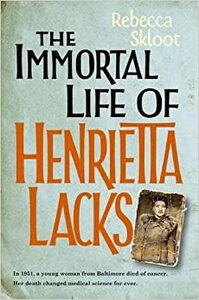Take a photo of a barcode or cover
adventurous
challenging
emotional
informative
inspiring
medium-paced
I like when science is presented within a story and Skloot does an excellent job with this combo.
In a word, devastating. Complicated, emotional, and incredible, Henrietta's life and the impact on science are worth knowing.
Pretty good. There were two things about this book that I did not expect.
First, the portion of the book covering Henrietta Lacks' life up until her death was only about the first third of the book. The remainder focused more on her family and the legacy of her cells from the 1950s until the present day.
Second, while this book did cover some of the scientific aspects of the immortal cell line and how it was used in medicine and research, it was much more an oral history biography of Henrietta Lacks and her family, particularly her daughter Deborah.
The book also covered a lot of questions about ethics and patient rights, but I found this to be done in a very positive way. Ms. Skloot does not prescribe a correct or preferred interpretation of the ethical issues, but presents an objective look at how this area of medicine has evolved in the past sixty years. She presents the family's viewpoints, and includes some landmark court cases that are relevant, but it's left to the reader to make their own decisions based on the information presented.
As it stands now, patients from whom tissue samples are taken do not have any legal right to those tissues or what is done with them. I'm still not sure what I think about this - it is something I will have to consider for a while before I can come to a stance one way or the other, I think.
First, the portion of the book covering Henrietta Lacks' life up until her death was only about the first third of the book. The remainder focused more on her family and the legacy of her cells from the 1950s until the present day.
Second, while this book did cover some of the scientific aspects of the immortal cell line and how it was used in medicine and research, it was much more an oral history biography of Henrietta Lacks and her family, particularly her daughter Deborah.
The book also covered a lot of questions about ethics and patient rights, but I found this to be done in a very positive way. Ms. Skloot does not prescribe a correct or preferred interpretation of the ethical issues, but presents an objective look at how this area of medicine has evolved in the past sixty years. She presents the family's viewpoints, and includes some landmark court cases that are relevant, but it's left to the reader to make their own decisions based on the information presented.
As it stands now, patients from whom tissue samples are taken do not have any legal right to those tissues or what is done with them. I'm still not sure what I think about this - it is something I will have to consider for a while before I can come to a stance one way or the other, I think.
Really informative and a fast read. Amazing how many scientific advancements have been made because of Henrietta Lacks!
informative
reflective
medium-paced
Wow, that was a lot of science. The author made it easy to understand but I think I was expecting something more novelesque. She waited until the very end to bring in the very legitimate arguments on both sides of tissue/ cell use.
I don't normally choose to read non fiction, but I'm glad I read this book. Rebecca Skloot did a fearless job of research to bring the Lacks family story to light. Numerous issues are touched on, not only the way the cells were taken for study without informed consent, but also race, poverty, medical ethics and research ethics, to name a few.
dark
informative
sad
medium-paced
Saw the movie, which I found to be pretty flat and the book was about the same. Was a bit bothered by her representation of dialect




